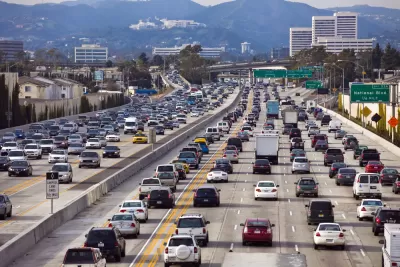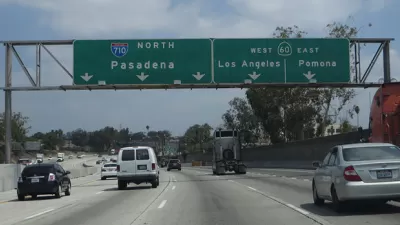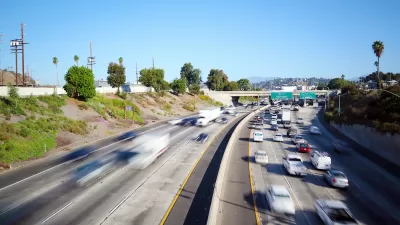Was the I-405 widening project worth it for Los Angeles? Depends on whom you ask.

Adam Nagourney performs a post-mortem of sorts on the widening of the 405 Freeway in Los Angeles, which hasn't been able to escape the news as costs continue to skyrocket (the most recent spate of unexpected expenses puts the cost of the project up to $1.6 billion) and benefits to drivers have been scant or nonexistent.
The question examined by Nagourney on behalf of many in the state and region: Was it worth it?
The data tell a distressing story about the project's effect: "Peak afternoon traffic time has indeed decreased to five hours from seven hours’ duration (yes, you read that right) and overall traffic capacity has increased. But congestion is as bad — even worse — during the busiest rush hours of 4:30 to 6:30 p.m." That dose of induced demand is verified by a study undertaken by the Los Angeles County Metropolitan Transportation Authority (Metro).
Some in positions of power, like the current head of Metro, Philip Washington, say the project delivered benefits in capacity and safety. Critics point out that news of the project's continued cost overruns was delayed to the political benefit of Measure M—a sales tax approved by voters in November.
If there's one thing that can assuage the guilt of Los Angeles political leaders and voters who might regret the project, it's that the 405 is not the only example of a major highway project failing to deliver the desired congestion relief. An expansion of the I-10 Katy Freeway in Houston also induced demand to the detriment of travel times at costs involving the word billion.
FULL STORY: Los Angeles Drivers on the 405 Ask: Was $1.6 Billion Worth It?

Planetizen Federal Action Tracker
A weekly monitor of how Trump’s orders and actions are impacting planners and planning in America.

Maui's Vacation Rental Debate Turns Ugly
Verbal attacks, misinformation campaigns and fistfights plague a high-stakes debate to convert thousands of vacation rentals into long-term housing.

San Francisco Suspends Traffic Calming Amidst Record Deaths
Citing “a challenging fiscal landscape,” the city will cease the program on the heels of 42 traffic deaths, including 24 pedestrians.

Defunct Pittsburgh Power Plant to Become Residential Tower
A decommissioned steam heat plant will be redeveloped into almost 100 affordable housing units.

Trump Prompts Restructuring of Transportation Research Board in “Unprecedented Overreach”
The TRB has eliminated more than half of its committees including those focused on climate, equity, and cities.

Amtrak Rolls Out New Orleans to Alabama “Mardi Gras” Train
The new service will operate morning and evening departures between Mobile and New Orleans.
Urban Design for Planners 1: Software Tools
This six-course series explores essential urban design concepts using open source software and equips planners with the tools they need to participate fully in the urban design process.
Planning for Universal Design
Learn the tools for implementing Universal Design in planning regulations.
Heyer Gruel & Associates PA
JM Goldson LLC
Custer County Colorado
City of Camden Redevelopment Agency
City of Astoria
Transportation Research & Education Center (TREC) at Portland State University
Jefferson Parish Government
Camden Redevelopment Agency
City of Claremont





























